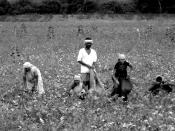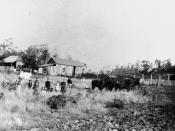World War II is an unforgettable event in our world's history. With such a epic story of war, the infamous Nazi Party dictator, and the coalition of the great allied nations to stop the spread of evil, and in addition all those brave soldiers who risked their lives for greater good, it has grown into a landmark in history. But the question remains: with all the attention on the action overseas, what was going on with the Nation's citizens right here at home?
During the 1940's, many changes erupted for the southerners here in the homeland. Some changes were for the worse, and some for the better. With the demand for workers that were needed to supply the enormous war, this gave many southern farmers a gift of opportunity right at their front door. The main majority of the southern populations in particular were in the farming business, which usually by default is the only job a southerner is eligible for.
With family run farms that hold the individuals last name for generations and generations it was difficult for one to leave the current repetitive lifestyle. With working conditions that are considered grave to a city dweller, they were normal to the average farmer. Many were just scared to leave, in fact there were rumors that the big city's destroyed an individuals morals, where he is constantly surrounded by booze, sex, drugs and gambling.
Many of the black farmers just could not leave because they have debt in the county, or debt owed to their employer or loaner. The ones that tried to leave were usually stopped by a sheriff at county lines, and who knows the punishment received for trying to escape from debt for new opportunities for a southern black farmer in the 1940's.
Many young farm men wanted to join, or were drafted into, the military. Unfortunately, this was at the same time that many of the older farmers were retiring from the business. Between 1940 and 1945 millions of farmers left the farm and moved to big cities or joined the military. Some of this was the result of higher paying industry jobs luring them away, but some of it was due to the increased mechanization of farm life, which actually required fewer workers to do the job.
Because of the need to keep agricultural production going, and increasing if possible, Congress passed an Amendment, which deferred farming workers from military service. Before that, many local draft boards classified agricultural workers essential, deferring them from service because of the essential role they played in dairy, livestock or poultry production. Because of the crucial role these individuals played in the war effort the Army and Navy adopted a policy of not accepting the enlistment of any man whose local draft board considered to be an essential farm worker.
Farming during the Second World War was one of increase as well as one of hardships. On the plus side, farmers had increased their mechanization drastically to what it had been five or six years earlier. Tractors were becoming a very important way of life for most farmers. To meet the rising food demands of the war farmers became creative in their farming methods and increased production to all-time highs. And it was done basically without using more land and producing more crop. This rise in production, with the rising food demand pushed agricultural income of what it had been immediately before the war. For the first time in quite a while many farmers actually had available cash, who can now put money down on counters in store fronts.
With the revitalization of the economy from the war, the farming industry greatly advanced in profits, and technology. But there were also hardships and a downside to farming during the war. Just like other citizens on the home front, farmers were also faced with shortages on supplies, and although they did get additional assistance from government programs because of their important role in the war effort, they often had trouble getting and maintaining farm their farm equipment. There was also a shortage of specific items like fertilizers, mostly because so much of it had been imported. But by far the greatest shortage faced by farmers was workers. Workers who had left for new opportunity, to began working on hourly wages, have better living conditions, and to escape from the community and family pressure. These individuals ventured out to their own desires, breaking the ancestry of family farming.





